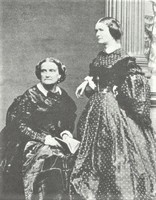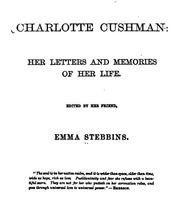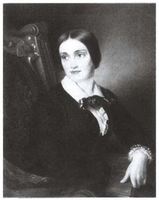"Charlotte Cushman, the Actress." Wood County Reporter, Jan 11, 1883
Dublin Core
Title
"Charlotte Cushman, the Actress." Wood County Reporter, Jan 11, 1883
Subject
Cushman, Charlotte Saunders, 1816-1876
Stebbins, Emma, 1815-1882
Gender Norms
Social Critique
Actors and Actresses--US American
Praise
Description
The article traces the "hopeful possibilities of girlhood" of Cushman "who did not allow herself to be crushed by circumstances." It criticizes old-fashioned ideas of the "women's sphere" and defends Cushman's gender-bending behavior and attitude: "no girl need shrink from being true to herself for fear of the world’s opinion."
The article quotes from Stebbins's memoir who is mentioned as one of Cushman's biographers and a "friend."
The account given here praises Cishman world-wide success while, simultaneaously emphasizing the hard work of Cushman against all odds. Cushman thereby serves as an example for the next generation.
The article quotes from Stebbins's memoir who is mentioned as one of Cushman's biographers and a "friend."
The account given here praises Cishman world-wide success while, simultaneaously emphasizing the hard work of Cushman against all odds. Cushman thereby serves as an example for the next generation.
Source
Publisher
[J.N. Brundage]
Date
1883-01-11
Type
Reference
Article Item Type Metadata
Text
The biographies of great women are not always encouraging. Sometimes they are depressing to ambitious, yet self-distrustful girls. “Why should I study and seek to imitate such a character?” is a question that rises in the mind of one whose talents are mediocre and opportunities for culture limited. The hopeful possibilities of girlhood are clearly illustrated in the career of Charlotte Cushman, who did not allow herself to be crushed by circumstances. To have surmounted such obstacles as beset her path is to have become a beacon, lighting the steps of the weary and despondent who adopt her alluring jet dangerous profession. Dr. Bartol speaks truly of this illustrious and irreproachable actress when he says that “she made the connection of genius and virtue.” The reminiscences of Charlotte Cashman's earliest days in Boston open with the sentence, “I was born a tomboy.” One of her biographers (her friend Emma Stebbins, in “Charlotte Cushman, Her Letters and Memories of Her Life”) explains the epithet by saying that in those days it “was applied to all little girls who showed the least tendency toward thinking and acting for themselves.” Prejudice and constraint must at one time have pressed heavily upon the strong, free nature of one who was in every way so original in her thoughts, and independent in her actions. “My earliest recollections,” she continued in her memoranda, “are of doll’s heads ruthlessly cracked open to see what they were thinking about. I was possessed with the idea that doll’s could and did think. I had no faculty for making doll’s clothes, but their furniture I could make skillfully. I could do anything with tools.” To acknowledge that the needle is not a favorite implement, requires less courage on the part of girls to-day, than it did when Charlotte Cushman was young. Cutting out pieces of calico and sewing them together again with the “over and over” stitch has given place to quite as useful and far mere artistic employments. Piecing blocks and darning stockings are no longer exacted. The model girl is quite apt to do the things that her brother does, greatly to the advantage of her mind and body. The day has passed when pursuits that used to belong to boyhood alone, impeach her femininity. The bounds of propriety and decorum must be observed, but girls may think and act for themselves. No disgrace is attached to individuality. Probably few girls will care to be extremists in the exercise of their freedom, as we suspect Charlotte Cushman was when she says; “ Climbing trees was an absolute passion; nothing pleased me so much as to take refuge in the top of the tallest tree when affairs below waxed troubled and insecure. I was very destructive to toys and clothes, tyrannical to brothers and sister, but very social and a great favorite with other children. Imitation was a prevailing trait.” Referring again to her imitative faculty she says: “Besides singing everything I exercised my imitative powers in all directions, and often found myself instinctively mimicking the tones, movements and expression of those about me. I’m afraid I was what the French call ‘un enfant terrible’—in the vernacular, an awful child; full of irresistible life and impulsive will; living fully in the present, looking neither before nor after; as ready to execute as to conceive; full of imagination.” She left school when only thirteen years of ago, the necessities of the family obliging her to assist in hei own support. Repeated failures seem to have been the real foundation of her wonderful success in the profession she finally chose. Surely, in reviewing the life of Charlotte Cushman no girl need utterly despair because of obstacles in her path; no girl need shrink from being true to herself for fear of the world’s opinion. A great, grand woman, from whose example many fainting spirits will draw fresh inspiration, has proven that a girl need not be wholly conventional in her life, or even have much reverence for old-fogy notions of “woman’s sphere” in order to be at once admired, esteemed, honored and beloved. Not conformity to custom, but character is demanded of the girls of to-day. Charlotte Cushman who, as a woman and an actress moved and melted the hearts of multitudes, also possessed a genius for many other pursuits. When a girl, she “could do anything with tools.” Let those who hate to sew take heart! Perhaps there are other things for which they were specially created. With capacity and will girls may, by faithful effort, rise above adverse circumstances. To cramp and narrow one’s nature by petty, uncongenial occupations, because of hereditary prejudice against honorable callings, is 10 de- feat the end of existence which is the complete development of all our powers. The girl of the nineteenth century is privileged to sew if she wishes. But she can use the saw or the hammer if she prefers. She can refuse to accept traditional judgments even of actresses and the stage, since Charlotte Cushman and other heroic souls have so honored the profession of the drama. The following extract from a letter, written by a friend of Miss Cushman’s, contains a description of her personal appearance as a girl which may be interesting to the reader: I shall never forget our first meeting after many years of absence. It followed the English period of her career when she had attained to a world-wide reputation, and that social prestige which wealth and character cannot fail to command. We sought her, and at last met face to face with the old schoolmate. There was the same uncalcuiating, fresh, frank face; the same merry, clear blue eye. but without the long, flowing yellow locks to cast back in haste from their obtrusive sweep; the same bold tread, now become regal. She seated herself in front of me, holding both my hands in the sincere grasp of hers while she went back over the times when, as she said we were boys together, albeit I had no such penchant for masculine masquerade as she, with the glory of her Romeo behind her, might reasonably entertain. She recalled with the greatest gusto and laughter long and loud, an earlier stage debut than the world had seen, when in our school days, her mother, my eldest sister land perhaps one or two of our neighbors made up the audience to our first representation of Bluebeard, in the large attic chamber of her mother’s house. This was before the days of popular private theatricals, and marks the mind to dare and do at that early age.
Although the tendency to do and dare was so strong in Cushman, we know that she had a sweet, generous disposition, and that wherever she went in the world she shed courtesy and kindness upon all about her. Added to her many virtues was that of helpfulness, nowhere shown more forcibly than in her efforts to aid a young friend who finally became an actress, and to whom she wrote: How many there are who have a horror of my profession! yet I dearly love the very hard work, the very drudgery of it, which has made me what I am. Despise labor of any kind! I honor it, and only despise those who do not find sufficient value in it to admire. * * * * I should advise you to get to work; all idea! study of acting without the trial or opportunity of trying our efforts and conceivings upon others, is, in my mind, lost time. Study while you act. Your conception of character can be formed while you read your part, and only practice can tell you whether you are right. You would, after a year of study in your own room, come out unbenefitted, save in as far as self-communion ever must make us better and stronger; but this is not what you want just now. Action is needed. Your vitality must in some way work itself off. You must suffer, labor and wait before you will be able to grasp the true and the beautiful. You dream of it now, the intensity of the life that is in you, the spirit of poetry which makes itself heard by you in indistinct language, needs work to relieve itself and t e made clear. ***** God bless you, and prosper your undertakings. I know the country theaters well enough to know how utterly alone you will be in such companies; but keen up a good heart; we have only to do well what is given us to do, to find heaven. To do well what is given us to do is the secret of success in any profession, whether it is one of our voluntary choice or one in which we have been placed by uncontrolable circumstances. In the life of this great actress and tireless worker, there were seasons of discouragement and distress. With all her courage and decision she knew what it was to be home-sick and sad. Doubt sometimes perplexed her. Her struggles before she achieved recognition in England led her once to write: How little do we estimate our good gifts of fortune until we are deprived of them ! And this, though worn out and stale as a proverb, comes upon me with full force at this time. When desponding, I repent that I have left my home. I reproach myself that I was not content with a moderate competency, while in its enjoyment, but must thrust myself out from the delight which I was permitted to enjoy, for this miserable, frightful uncertainty, this lingoring doubt which at last may lead to disappointment. That it did not lead to disappointment we know by her great reputation and the glowing tributes paid her in all lands even before the curtain of death dropped upon her “vanished majesty.” True it is that she “ trod the boards in all the queendom of the drama,” and yet she sadly asked the question; “What is or can be the record of an actress, however famous?” She thought that other artists—- poets, painters, sculptors, musicians— produced something worthy to live after them, something which hallowed their memories and gave evidence of a divine mission. “But we,” she said, “we strut and fret our hour upon the stage, and then the curtain falls and all is darkness and silence.” How much has been and will yet be said in answer to her question. She has indeed shown what the record of an actress can be.
Although the tendency to do and dare was so strong in Cushman, we know that she had a sweet, generous disposition, and that wherever she went in the world she shed courtesy and kindness upon all about her. Added to her many virtues was that of helpfulness, nowhere shown more forcibly than in her efforts to aid a young friend who finally became an actress, and to whom she wrote: How many there are who have a horror of my profession! yet I dearly love the very hard work, the very drudgery of it, which has made me what I am. Despise labor of any kind! I honor it, and only despise those who do not find sufficient value in it to admire. * * * * I should advise you to get to work; all idea! study of acting without the trial or opportunity of trying our efforts and conceivings upon others, is, in my mind, lost time. Study while you act. Your conception of character can be formed while you read your part, and only practice can tell you whether you are right. You would, after a year of study in your own room, come out unbenefitted, save in as far as self-communion ever must make us better and stronger; but this is not what you want just now. Action is needed. Your vitality must in some way work itself off. You must suffer, labor and wait before you will be able to grasp the true and the beautiful. You dream of it now, the intensity of the life that is in you, the spirit of poetry which makes itself heard by you in indistinct language, needs work to relieve itself and t e made clear. ***** God bless you, and prosper your undertakings. I know the country theaters well enough to know how utterly alone you will be in such companies; but keen up a good heart; we have only to do well what is given us to do, to find heaven. To do well what is given us to do is the secret of success in any profession, whether it is one of our voluntary choice or one in which we have been placed by uncontrolable circumstances. In the life of this great actress and tireless worker, there were seasons of discouragement and distress. With all her courage and decision she knew what it was to be home-sick and sad. Doubt sometimes perplexed her. Her struggles before she achieved recognition in England led her once to write: How little do we estimate our good gifts of fortune until we are deprived of them ! And this, though worn out and stale as a proverb, comes upon me with full force at this time. When desponding, I repent that I have left my home. I reproach myself that I was not content with a moderate competency, while in its enjoyment, but must thrust myself out from the delight which I was permitted to enjoy, for this miserable, frightful uncertainty, this lingoring doubt which at last may lead to disappointment. That it did not lead to disappointment we know by her great reputation and the glowing tributes paid her in all lands even before the curtain of death dropped upon her “vanished majesty.” True it is that she “ trod the boards in all the queendom of the drama,” and yet she sadly asked the question; “What is or can be the record of an actress, however famous?” She thought that other artists—- poets, painters, sculptors, musicians— produced something worthy to live after them, something which hallowed their memories and gave evidence of a divine mission. “But we,” she said, “we strut and fret our hour upon the stage, and then the curtain falls and all is darkness and silence.” How much has been and will yet be said in answer to her question. She has indeed shown what the record of an actress can be.
Location
Grand Rapids, WI, US
Geocode (Latitude)
42.9632405
Geocode (Longitude)
-85.6678639
Social Bookmarking
Geolocation
Collection
Citation
“"Charlotte Cushman, the Actress." Wood County Reporter, Jan 11, 1883,” Archival Gossip Collection, accessed April 18, 2024, https://www.archivalgossip.com/collection/items/show/665.




